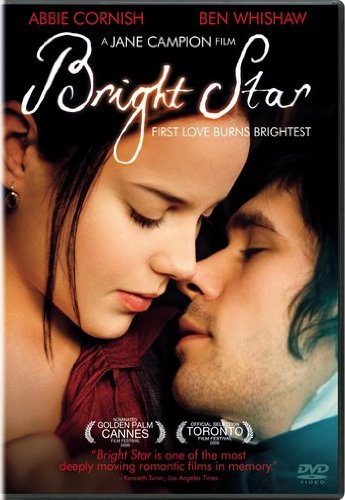
It’s been 16 years since director Jane Campion earned an Oscar nomination for directing The Piano. Since then, however, she hasn’t had a whole lot of success (personally, I still have nightmares about Harvey Keitel in Holy Smoke!). But now the buzz is building for Campion’s latest, Bright Star. In fact, anyone who mentions Campion’s name these days often uses the word “Oscar” in the same sentence. But, after seeing Bright Star, I’m not entirely sure why.
Bright Star follows the love story of poet John Keats (Ben Whishaw) and Fanny Brawne (Abbie Cornish), a headstrong young woman with an eye for fashion. When they meet, he’s moody and penniless—suffering from poor book sales, bad reviews, and the serious illness of his brother. She, meanwhile, is smart and witty and thoughtful—and she does more than just lift his spirits; she also inspires him to write again.
The problem, however, is that Keats can’t even support himself—let alone a wife. No matter how passionately they love each other, they’ll never be able to marry—but they can’t bear to be apart, either.
Right from the start, Bright Star has more than its fair share of obstacles to overcome—because it’s not just a period piece; it’s a period piece about a nineteenth-century poet. And that makes it a pretty tough movie to sell to anyone who didn’t study English lit rather extensively in college. At the same time, though, even those of us who did study English lit—who can smile fondly when Whishaw’s Keats starts reciting some of his more memorable poems—probably aren’t familiar enough with Keats or his poetry to recognize (or even fully understand) all of the lines as he recites them. And that often makes the dialogue a bit…perplexing. Sure, it all sounds beautiful, but it goes by so quickly that you’ll rarely be able to grasp its meaning.
Still, Bright Star is truly a gorgeous film. At times, you might even call it exquisite. Campion treats her viewers to scenes in romantic old country houses and lush, grassy fields—and the cinematography is so crisp that you’ll swear you can feel the warm summer breeze as it blows through the meadows. The costumes, too, are stunning—with vibrant colors and striking details (like Fanny’s hand-stitched pleats and ruffled collars).
Unfortunately, those stunning costumes and beautiful images can’t make up for the underdeveloped characters or their distant, detached story. Though Cornish does a remarkable job of portraying Fanny’s wit and passion, she didn’t really have much to work with. Her relationship with Keats is almost as hazy and as puzzling as Keats himself. He’s sullen and enigmatic and not particularly pleasant to be around, yet she falls madly, passionately in love with him—and he, apparently, with her. The romance seems to come out of nowhere—and the story offers little to connect to emotionally. Though there are a few enchanting moments—and some quietly romantic scenes—they’re few and far between.
So although Bright Star is an absolutely gorgeous film, its beauty is disappointingly shallow. And, in the end, it’ll leave you feeling empty—like you should have cared, but you just couldn’t.


